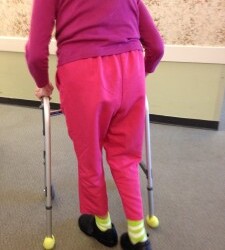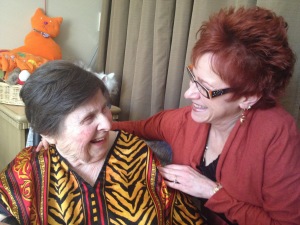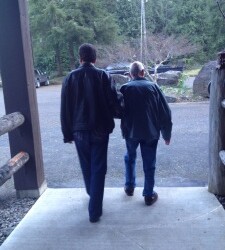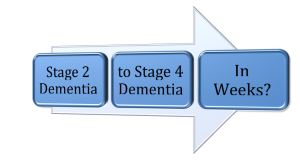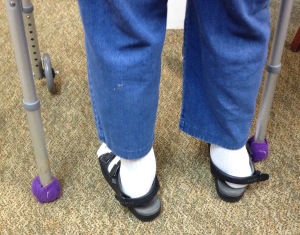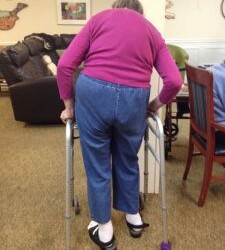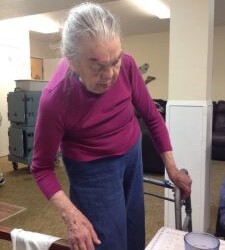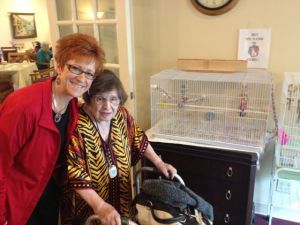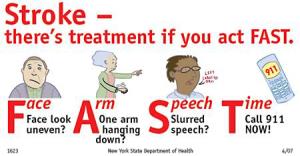by Diane Masson | Aug 30, 2015
Would you build a chicken coop to have a senior move into your retirement community? Are chickens even allowed? What would your senior living community promise in order for a senior to move in? How many cats does your retirement community allow per senior resident? Would you increase it? Are you willing to take on two 100-gallon tanks of fish? One fish tank contains large koi and the other fresh water bala sharks. “I still have my wits about me and don’t want to leave my animals,” said a prospective senior resident. “The administrator has promised me that he will take all my pets and if I pass away, he will let all of my precious chickens live with him at his home. He loves my chickens.” This senior is waiting for a two-bedroom apartment to become available, but she has still not decided to actually move. Her family and friends (I am one of them) have been encouraging her to make a move for two years. She currently lives alone in a two-story home with a caregiver who helps several days a week. Who knows how many years my senior friend has left? I don’t know. What I do know is that my friend would thrive in a retirement community with live music and weekly entertainment. She used to be very active with dozens of friends and now she is isolated in her home with early dementia and a lack of mobility. My senior friend comes to life over a lunch or dinner conversation. I told her that she could have social connectivity everyday if she moved into...
by Diane Masson | Aug 23, 2015
Discover key differences between rental facilities versus Continuing Care Retirement Communities. Do you have enough financial resources if you need to be in a higher level of care for an extended period of time? Always consider your future health care needs today. Who will provide your care and at what cost? Do you want 100% responsibility for your future health care costs or do you want to share the risk with a Continuing Care Retirement Community? Author, Diane Masson, shares her insights from her new book, “Your Senior Housing Options.” Enjoy my TV interview below and for weekly tips join at: Www.Tips2Seniors.com Your Senior Housing Options,” has a simplistic title, but what’s inside this new book can save a you months of research time. Hear Diane Masson’s interview of how her mother and in-law’s faced the pivotal decision to plan ahead or wait until a crisis. Learn the pitfalls from transitioning from your home to senior housing. Understand what questions to ask, insider tips and dirty secrets revealed. For weekly tips join at: Www.Tips2Seniors.com Diane Masson has worked in senior housing for 17 years and is the regional marketing director for two debt-free Continuing Care Retirement Communities in Southern CA (Freedom Village in Lake Forest and The Village in Hemet). Her first book “Senior Housing Marketing – How to Increase Your Occupancy and Stay Full,” is being utilized by senior housing professionals across the country. Both her first book and second book, “Your Senior Housing Options,” have a 5-star rating on...
by Diane Masson | Aug 16, 2015
I asked the same question to four memory care communities that were licensed as assisted living. The responses might surprise you and help you determine where to place your own mom or dad. What happens if my mother-in-law wakes up disoriented at 2:00 AM and gets up to find the bathroom? Then she falls… Memory Care Community A – “When we find her, a med tech would evaluate her. If she hit her head or something major happened, then 911 is called. My husband asked about the med tech training. Is it like an emergency medical technician (EMT) with a minimum of 140 hours of medical training? She said, “No, it is like a CNA (Certified Nursing Assistant). There are specific criteria that they are trained on.” Does someone go with the dementia resident if they go out 911? No! Diane’s opinion: In my experience, no CNA has the medical expertise to make a judgment call on a fall. My mother’s assisted living community always sent my mom out 911 from a fall in the middle of the night. It happened five times. It was highly traumatic for her. When someone arrives at the emergency room with dementia, it is scary and confusing. It would disorient her for days after each traumatic adventure. Memory Care Community B – “We have certain guidelines to know when to call 911. In the past month we have had two seniors go out 911. Eighty percent of the time falls do not require 911. We would call the family to meet the senior at the hospital.” Does someone go with the dementia resident...
by Diane Masson | Aug 9, 2015
My seatmate flying up to Seattle shared that his mom can no longer prepare her own meals. She was diagnosed with Parkinson’s about one year ago. She is currently living in Washington State and can no longer drive. The local family needs to bring her meals to sustain her. Is it fair to rely on your family to keep you at home? The mom refused to move to California to live with one of her sons. He specifically bought a home with a “mother-in-law apartment” for her. But she did not want to leave her home or local friends. Another adult child comes monthly to take her to doctor appointments. My seatmate, her son, visits her about every six months because he lives 1000 miles away. The family is getting together from all over the country to celebrate her milestone birthday. They are going to discuss future care options, because she is not safe living alone. I suggested he read my new book to help him with his dilemma. He learned that the assisted living community under consideration is about $5,000 a month. He didn’t know that transitioning to skilled nursing care at some point could cost the family around $90,000 a year on a national basis. The family figured all the children could chip in to support mom to live in a higher level of care. So they want to check out her possible VA Benefits as the spouse of a deceased Veteran. So I shared with him that for VA Benefits to begin, three keys need to happen: The mom needs to spend down her assets. She...
by Diane Masson | Aug 2, 2015
Last week we had 24 new residents at our new resident reception. Out of 24 new senior residents: Two senior couples had met online. One senior couple had met by each placing an ad in the local paper. Wow! How exciting is that? Seniors are finding love after losing a spouse of 30 or 40 years. One of these couples met through E-harmony. We had dinner together and they shared their exciting journey. They each filled out a lengthy questionnaire to find the perfect mate. Each was looking for someone who loved to travel. The gentleman rejected a potential date with a senior who only loved cruising, another lady only wanted to travel to Europe and a third potential senior woman was a retired stewardess. This senior man was patiently waiting for a senior woman who wanted to travel by RV or motorhome around the country. After finding that potential senior woman online, they only corresponded through the dating website for next three months. Then they exchanged emails and phone numbers. They both proceeded cautiously. Well their relationship bloomed into marriage and traveling the country by RV for four years. You can see a glow on each of their faces when they speak of the other. They decided to settle at The Village in Hemet, CA. They wanted to create a plan for their future and not be a burden to their families in a health care crisis. They are trying every community activity together, such as exercising in the health club, enjoying live performances and swimming three days a week. Both of them love life and are enthusiastic...
by Diane Masson | Jul 26, 2015
Let’s hear from professionals around the world to see if this assumption is correct! Do seniors need fewer days of hospice in assisted living and skilled nursing than at home? It makes sense to me. An article by the Philly Voice stated, “At hospice enrollment, between 2008 and 2012, 78,130 of the patients in the study lived at home and 7,451 were in assisted living.” My own mom with vascular dementia, living in skilled nursing care, only needed 4 days of hospice care. While my mom was actively dying with hospice care, I read about all the signs people show approaching death. In a great little book called, “Gone from my Sight, The Dying Experience,” by Barbara Karnes, RN, I learned how seniors start to withdraw one to three months prior to death. The desire for food decreases while sleep dramatically increases. A senior can become more disoriented, agitated and talk with the unseen one or two weeks before death. As I held my mom’s nonresponsive hand a few days before her death, I realized that most of what the book predicted had happened to my mom in the previous few months. Yet she was completely supported in her skilled nursing environment. What a gift that community gave her. When she could not feed herself (she forgot how because of her dementia), the caregivers or I would feed her. At every meal she was given an opportunity to feed herself. The staff never gave up on her improving. If my mom had been home, I would have fretted and taken her to the doctor to learn why she was...
by Diane Masson | Jul 19, 2015
End of life decisions are so difficult for an advocate to make for his or her’s senior parent. A few months ago, I had to make tough choices for my mom before she passed. A month ago, my husband and his family faced difficult choices for his dad. My father-in-law, Bill, had been on home hospice with 24/7 care for about three months. He was frail (worn out from being a caregiver for his wife who had Alzheimer’s), had inoperable blockages in his heart, had four small strokes that my sister-in-law witnessed and was frustrated with early dementia. He was reaching for the cat when he fell. The hospital determined that his pelvis was fractured in multiple locations and his femur (thigh bone) was broken. So Bill would be bed ridden the rest of his life. Sigh…he was in so much pain. They were turning Bill every two hours to prevent bedsores. He could only be on his back and the side without the broken femur. He was a two-person transfer. The fall that sent him to the hospital was a non-hospice related incident so it was covered by insurance. With no hope of improvement the hospital determined that he was once again comfort care. So according to the hospital, he was a hospice patent who needed to move out of the hospital or pay privately. The only skilled nursing care facility in the area was not an option (bad reputation). There were no hospice facilities in the local area. So the only two choices were: Stay in the hospital for a cost of $48,000 a month. Go home...
by Diane Masson | Jul 12, 2015
Most seniors want to stay in their own home. Learn five keys in this TV interview to differentiate a reputable home care company from a fly-by-night company. Paying a caregiver under the table may end up being your most expensive option. Can you afford 24-hour home care? If not, learn the costs of your other options before you deplete your resources. Learn more insider tips in a new resource book, “Your Senior Housing Options” or get weekly advice for free at WWW.tips2seniors.com. “Your Senior Housing Options,” has a simplistic title, but what’s inside this new book can save you months of research time. Hear Diane Masson’s interview of how her mother and in-law’s faced the pivotal decision to plan ahead or wait until a crisis. Learn the pitfalls from transitioning from your home to senior housing. Understand what questions to ask, insider tips and dirty secrets revealed. The decision to stay home requires caregivers. Prevent elder abuse by determining if a home care agency is reputable, before they move into your home. You are just not looking for today’s needs, but for your future care. Discover key differences between rental facilities vs Continuing Care Retirement Communities. Do you have enough financial resources if you need to be in a higher level of care for an extended period of time? For weekly tips join at: Www.Tips2Seniors.com Diane Masson has worked in senior housing for 17 years and is the regional marketing director for two debt-free Continuing Care Retirement Communities in Southern CA (Freedom Village in Lake Forest and The Village in Hemet). Her first book “Senior Housing Marketing – How to Increase Your Occupancy and Stay Full,” is...
by Diane Masson | Jul 5, 2015
Professionals have told me that a trauma could have caused Amy’s dementia (my favorite mother-in-law) to escalate rapidly. Is this true? Can all the dementia professionals and family members weigh in with their experiences? My mother-in-law’s dementia was progressing slowly like my mom’s vascular dementia. There are four stages of memory loss and Amy was in stage 2, before the trauma. She repeated herself a lot, needed cueing for personal hygiene, medication management and had little desire to leave the home. Amy talked about not being able to remember stuff, but she could still read the paper, dress, bathe, toilet and feed herself. Then Bill, my favorite father-in-law and Amy’s 24-7 caretaker, had a heart attack and went to the hospital. Amy could not understand where her rock and husband of 65 years had gone. She ended up having a psychotic break and eloping (The police had to find her and bring her back home.). A whole series of dramas happened and she hit a nurse. Then she too was hospitalized and put on psychotropic medications. Amy was in the hospital for three weeks in the psych ward. By the time she got out of the hospital, the Amy I had seen months earlier was gone. The first time my husband and I saw her after the hospitalization (we live three states away) was so sad. The vivacious and sarcastic Amy was gone. It was like seeing a shell of her former self. Her lip trembled, her arm shook and she was so sleepy from the Haldol drugs. We immediately got the psychotropic medication reduced by half. It took...
by Diane Masson | Jun 28, 2015
We all have storms in our lives. Maybe the storm is a death, sickness, or major life crisis. It could even be one of Mother Nature’s storms such as hurricane, tornado or earthquake. You or a senior you know may be going through a storm at this moment. At some point the storm always ends. There is peace and calmness again. No one is the same after one of life’s storms. The length of the storm will most likely determine the amount of wisdom gained. One of my best friends is a breast cancer survivor. Now she uses the knowledge of her successful treatments and faith to help others. She can make someone elses cancer journey less scary. What a gift! As retirement counselors in senior living and housing, we can provide that gift of knowledge to a senior considering a move. A senior may feel like they are in a storm processing a major life move to your community. Being pulled toward the benefits of living in a retirement community and simultaneously being drawn back to the security of their home can create conflict for a senior. Here are a few tips: First, a retirement counselor needs to acknowledge that a senior is facing an emotional decision (the storm). The decision is to plan ahead or wait until a health care crisis. Second, if a senior chooses to wait until a health crisis they will be forcing their adult children to eventually “put them someplace” (bigger storm). Many seniors don’t realize this truth. Seniors are typically shocked to learn they will have a 66% chance of needing a...
by Diane Masson | Jun 21, 2015
“Your Senior Housing Options,” has a simplistic title, but what’s inside this new book can save you months of research time. Hear Diane Masson’s interview of how her mother and in-law’s faced the pivotal decision to plan ahead or wait until a crisis. Learn the pitfalls from transitioning from your home to senior housing. Understand what questions to ask, insider tips and dirty secrets revealed. The decision to stay home requires caregivers. Prevent elder abuse by determining if a home care agency is reputable, before they move into your home. You are just not looking for today’s needs, but for your future care. Discover key differences between rental facilities vs Continuing Care Retirement Communities. Do you have enough financial resources if you need to be in a higher level of care for an extended period of time? Please enjoy my new interview. For more info: Www.Tips2Seniors.com Diane Masson is a senior housing expert, the author of two books and regional marketing director for two debt-free Continuing Care Retirement Communities in Southern CA: Freedom Village in Lake Forest and The Village in...
by Diane Masson | May 31, 2015
It’s hard to be an advocate for a senior for years on end. I advocated for my own mom (with vascular dementia) for over 10 years, until I recently lost her. Advocacy is not an easy job and it can entail sleepless nights of concern. It’s vital to select a Power of Attorney (POA) who currently knows you well enough. If you can no longer speak on your own behalf, your POA needs to know if you are over medicated or sedated just by looking at you. They need to know your baseline so they can help you and reverse the issue or accelerate an outcome in a timely fashion. The POA’s main purpose is to comply with your wishes that were indicated before you became incapacitated. They should always protect your best interests both mentally and physically. Over medication is a growing problem for seniors. I have heard many stories of hospitals overmedicating seniors. My own mother-in-law was over sedated in the emergency room. She has Alzheimer’s. They had no room in the psych ward and she was drug restrained for three days and two nights in the emergency room. Sigh… It has taken us four months to get my mother-in-law off Haldol. Psychotropic drugs and dementia do not mix well. Her POA thought the doctors understood what they were doing tapering off the medication. Unfortunately, my mother-in-law’s doctor admitted to knowing nothing about psychotropic drugs and was relying on others to advise her. Gulp… What a mess! We are talking about seniors’ lives… Neither the doctor nor the POA knew what to do about my mother-in-law’s medications...
by Diane Masson | May 24, 2015
It is important that seniors make a plan while they are healthy and well OR they will find themselves in a situation where family members have to “put them someplace.” My in-laws waited for a health care crisis that you can read about HERE and the adult children were forced to “put them” in more supportive environments. The doctor told my father-in-law that he needed 24/7 assisted living care and another doctor required that my mother-in-law with Alzheimer’s move into a secured memory care simultaneously. How do you find a good retirement community, assisted living, memory care or skilled nursing care? “Your Senior Housing Options,” gives tips and advice on exactly what questions a senior needs to ask in order to determine if a senior living provider is great or mediocre. Almost every week I speak to 50 to 75 seniors about their future health care and housing options. Two months ago, I created a new presentation based on my book, “Your Senior Housing Options.” What an impact it has made. Seniors share how grateful they are for clear and concise information that they can apply immediately in making a decision for themselves. This is my passion and I want to help seniors make a wise choice. The book articulates the costs and consequences of the various senior living options. I share the ramifications of waiting too long and how a senior can save money and stress by planning ahead. Seniors can take away valuable tips they can utilize immediately as they begin to research and explore long-term health choices. Most seniors have no knowledge of how to select...
by Diane Masson | May 17, 2015
Adult children just want their parent with dementia to be okay. Most do not have a clue on psychotropic (mind altering) medications or how they work. Families rely on professionals to recommend doses and medications for their senior parents. If a professional doctor or memory care community says that our mom or dad needs these medications, we tend to accept their wisdom. We are programed to not question authority. Yet when a parent is sedated in a drugged stupor over an extended period of time, more adult children are starting to ask why. At this point it can be too late for a senior with dementia. Psychotropic medications can have a lasting affect on a senior with dementia. Seniors may never be able to return to their baseline, before taking psychotropic drugs. My mother-in-law was given Haldol and now does the Haldol shuffle. It is a continuous stand up, walk, sit down and then it starts all over again. It is so sad to watch and they can’t stop. A professional told me it’s like their skin is crawling and they have to keep moving to make the feeling go away. When we recently brought my mother-in-law her favorite Greek food for lunch, she sat down in front of her favorite foods at the table and then immediately stood back up and started the Haldol shuffle again. She had no desire to eat her favorite foods. It has taken four months for the family to get her off the Haldol. My sister-in-law had to physically take my mother-in-law to her primary care physician and demand for the Haldol to...
by Diane Masson | May 10, 2015
My mother-in-law who got over drugged in the hospital several months ago is now in her second memory care community in Seattle. The first high-end memory care community in downtown Seattle wanted to follow the doctor’s recommendations of sedation. It took me three days to get the drugs reduced by half after I saw my overmedicated mother-in-law. Then the second memory care community promised our family that they would get her off the reduced Haldol dose. We believed them and paid a hefty community fee (a one time move-in fee) Sigh… It’s been almost two months in the second Memory care. We had an unproductive care conference about two weeks ago. When the family talked about changing the psych drugs the conversation led to considering Amy as a candidate for hospice because she was not eating. What? It turns out one of the drugs she began in the hospital was also an appetite suppressant. She was overmedicated in the hospital because there were no rooms in the psych ward, so my mother-in-law stayed in the emergency room for three days and two nights. Getting the picture of sedation now? My sister-in-law is on the warpath. She is demanding changes for her mom and talking about moving her to a third place. Will it help? The second memory care called my husband to see if they could save the move out. He simple said, “You have known that the family wanted my mom off the Haldol. How many phone calls and faxes have you made to the doctor to make that happen?” The administrator started to back pedal. My sister-in-law...
by Diane Masson | May 3, 2015
Here is a painful subject that I am going to bring up. Hundreds of people have reached out to me in the last week since my mother passed. So many of them shared a story about their own mom passing. Some were wonderful experiences that they will treasure and others were not. Sudden deaths are very hard. Every personal death I have experienced in my life was sudden, except for my mom’s death. You can read about my mom’s passing experience HERE. You either had a loving caring parent or you did not. This article is for those who did not. Many vulnerable sons and daughters were abused by either their mom or dad, sometimes both. We live in world that accepts dysfunctional families now. Family abuse that was hidden in the 1950’s and 1960’s can now be accepted in the mainstream. There are resources and counseling available so abused children (who have become adults) can acknowledge the abuse and move on. My mother was abusive to all her young children. You can read my article MEAN MOM, NICE MOM and DEMENTIA HERE. A wonderful counselor changed my life for the better and his recommendation is explained in my article MEAN MOM, NICE MOM and DEMENTIA HERE. My mom and I enjoyed over 20 years of a good adult relationship. I forgave her. Many of you know I have advocated for my mom’s care needs for the past 10 years. So what happens if an abused adult son or daughter still has unresolved issues at death with mom? Do they go to the funeral? Do they have a free pass not...
by Diane Masson | Apr 26, 2015
My mother’s blood sugar spiked to 400 on Monday and 520 on Tuesday. She was fighting a UTI and ecoli. At 92, her body tried to fight it off. The doctor said the antibiotics would either work in two days or she would go down hill fast. It was the later. The care ambassadors and nurses at Freedom Village were amazing. I lost count after twenty-three staff came in to say good-bye and provide loving care. One care ambassador said, “I’ve known your mom for two years and she was my family.” Another said, “Everyday she would greet me in the hall and compliment what I was wearing that day.” My favorite was someone reminding me of her love of cats and how she usually had one with her or would respond to the mechanical one that meowed, purred and moved. Her face would light up with joy. My mom lived in a higher level of care for nine years. Seven years in assisted living and almost two years in skilled nursing in Lake Forest, CA. Six years ago, a doctor made a comment that her life was not worth living because she had dementia and couldn’t remember anything. I replied, “How many of your patients said thank you and complimented you today?” The doctor sheepishly said, “Only your mom.” I said, “Then she still is fulfilling her purpose isn’t she?” The doctor backed off and gave the best care until my mom left that Seattle hospital. Through nine years of advocacy for my mom, I have done the best I was able, making decisions with the knowledge that...
by Diane Masson | Apr 12, 2015
What about you? Does one of your loved ones have dementia and still drive? Dementia drivers are jeopardizing other citizens walking in crosswalks and driving. My father-in-law was driving with a diagnosis of macular degeneration. He justified his actions by only driving in the daytime and limiting himself to a 5-mile radius to run errands and go the doctor. As his dementia progressed he got lost driving home within this radius. He chose to give up driving on his own. A friend told me about my mother driving several years ago. They said, “I saw your mom driving today, she can’t even see over the steering wheel. She is looking through the steering wheel in order to see the road.” I was horrified. This was completely unsafe. I still vividly remember the last time I drove with my mom. She was straddling two lanes (on the same side of the road). She said, “Diane, I know this looks bad, but I know exactly what I am doing.” I was terrified. It was the beginning of her dementia. A resident of a senior living community drove into another resident’s balcony. As he was parking the car, the senior hit the gas instead of the brake. After backing up, he made the same mistake again and rammed the balcony a second time. Afterwards, he was disoriented and could not remember how the accident happened or why he hit the gas twice. He did not give up his car keys after this incident. The resident whose balcony was destroyed requested to have the parking place right outside his apartment home, because he...
by Diane Masson | Apr 5, 2015
Many seniors believe Medicare will take care of everything. It is an unfortunate perception that is inaccurate. Two days ago, I was presenting senior living options to a group of seniors. One senior raised their hand and asked how Medicare fit in the picture of paying for senior housing. Here was my answer, “You have worked hard your whole life to have Medicare insurance. Most seniors have Medicare, a HMO and supplemental insurance. These will help you pay for doctors, hospital stays and up to 100 days of skilled nursing care (if you have a qualifying hospital stay). Medicare will not pay for any long-term care such as support in an assisted living community, long-term skilled nursing care or memory care. (I know this was a short version of a long answer.) Many seniors were surprised…here is some info from Medicare: “At least 70 percent of people over 65 will need long-term care services and support at some point. ‘Medicare and most health insurance plans, including Medicare Supplement Insurance (Medigap) policies, don’t pay for this type of care, sometimes called ‘custodial care.’ Long-term care can be provided at home, in the community, in an assisted living facility, or in a nursing home. It’s important to start planning for long-term care now to maintain your independence and to make sure you get the care you may need, in the setting you want, in the future.” This is a quote from the official Medicare and You 2014 Handbook, page 63. Have you encountered this misperception that Medicare will pay for long-term care? Diane Twohy Masson’s new guide book for seniors, “Your Senior Housing...
by Diane Masson | Mar 29, 2015
My sister-in-law witnessed my father-in-law, Bill, having a mini-stroke (TIA) this week. What a heartbreaking story. She was sitting with him in the living room and noticed his face droop on one side. Then his speech became garbled. It was over in two minutes and he could talk fine again. He had no idea it happened. She was understandable traumatized and wanted to talk about it. My husband and I are 1000 miles away and applaud her efforts to care for my father-in-law in her own home till he passes. We both think she is a saint. Through my Internet research it says a TIA is a mini-stroke. TIA’s can be warnings that a bigger stroke can be coming. In my mom’s case, she has had so many TIA’s that she has been diagnosed with vascular dementia. I have never personally witnessed a TIA with my mom. I guess you could say we were lucky it was only a TIA with Bill. Unfortunately, my father-in-law is now on hospice. Hospice is comfort care, so the goal is no hospitals or ambulances if at all possible. Every caregiver, family member and senior living professional should know the signs of a stroke and what to do. Stokes can cause permanent damage. If you get someone to a hospital in time, it can reverse the affects of the stroke. Go to www.strokeassociation.org to learn more. They say you should act FAST! FAST stands for: face drooping, arm weakness, speech difficulty and time to call 911. Have any of you encountered or witnessed a TIA or stroke? Diane Twohy Masson’s new guide...




